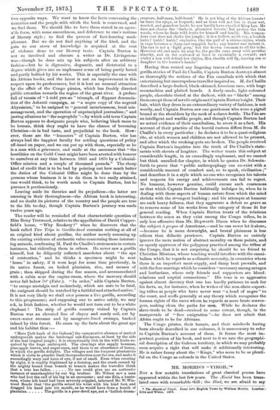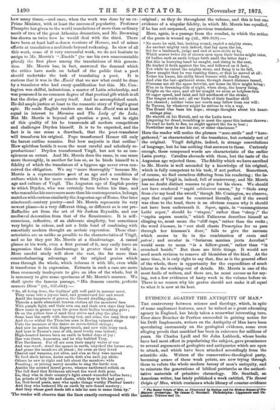MR. MORRIS'S " VIRGIL."'"
NOT a few notable translations of great classical poems have appeared within the last few years. The Lucid has been trans- lated once with remarkable skill ; the Iliad, we are afraid to say • The .Igneids of Vire. Done Into English Verse by William Morris. London : Ells and White. 1876.
how many times,—and once, when the work was done by an ex- Prime Minister, with at least the success of popularity. Professor Plumptre has given to the world translations of more than ordinary merit of two of the great Athenian dramatists, and Mr. Browning has shown us twice how he would deal with the third. There have been at least half-a-dozen versions of Horace, and of minor efforts at translation a multitude beyond reckoning. In view of all this work, some of it very successful work, we do not hesitate to assign to Mr. Morris's "Eneids" (to use his own unaccountable plural) the first place among the translations of this genera- tion. Mr. Morris has, in fact, answered the demand which the critics have made on behalf of the public that a poet
should undertake the task of translating a poet. It is -curious that it was in the £neid that we saw what could be done by a translator who had every qualification but this. Mr. Con- ington was skilful, industrious, a master of Latin scholarship, and was possessed in no common degree of that poetical gift which is all but the divine gift of poetry itself. And he accomplished much. He did ample justice at least to the romantic story of Virgirs great epic. He made English readers see that the "Eneid was at least equal in interest to Marmion and The Lady of the Lake, But Mr. Morris is beyond all question a poet, and in right of this quality of his he transcends all modern competitors and challenges Dryden himself. It is to be expected, and the fact is in one sense a drawback, that the poet-translator will transform his original. Pope transformed Homer till only the barest outline remains. But how majestic is that outline ! How spiritless beside it seem the most careful and scholarly re- productions ! Dryden transformed Virgil, but not to so con- spicuous an extent. And Mr. Morris does the same, in one sense more thoroughly, in another far less so, as he binds himself to a fidelity of which the translators of a bygone age never even con- -ceived the obligation. We say " more thoroughly " because Mr, Morris is a representative poet of an age and a condition of -culture which is far more remote than Dryden's was from the age and culture of Virgil. The Augustan age of English poetry to which Dryden, who was certainly born before his time, and who resembles his successors more than his contemporaries, belongs, matches with curious similarity the Augustan age of Rome. Our later nineteenth-century poetry—and Mr. Morris represents its very -newest phase—is a very different thing, as different as is our pre- Raffaelite art from the art of Sir Joshua Reynolds, and our anedireval decoration from that of the Renaissance. It is self- -conscious, reflective, of an elaborate simplicity, but sometimes very bright in colour, and not a little fond of combining with essentially modern thought an archaic expression. These char- acteristics are as unlike as possible to the characteristics of Virgil, and so far they put Mr. Morris at a disadvantage. A casual glance at his work, even a first perusal of it, may easily leave an impression that this disadvantage is greater than it really is. More careful study will show the vast, the far more than -counterbalancing advantage of the original genius which runs through the whole, which informs it with life, even while it transforms it in expression. Extracts in such a case are more than commonly inadequate to give an idea of the whole, but it is necessary to give some specimens of Mr. Morris's manner. We shall quote the famous passage, " His demum exactis, perfecto anunere Divas " (vi., 637_664) So, all being done, the Goddess' gift well paid in manner meet, They come into a joyous land, and greensward fair and sweet
Amid the happiness of groves, the blessed dwelling-place.
Therein a more abundant heaven clothes all the meadows' face With purple light, and their own sun and their own stars they have.
Here some in games upon the grass their bodies breathing gave ; Or on the yellow face of sand they strive and play the play;
-Some beat the earth with dancing foot, and some, the song they say:
And there withal the Thracian man in flowing raiment sings
Unto the measure of the dance on seven-folded strings ;
And now he !mites with finger-touch, and now with ivory reed.
And here is Teucer's race of old, most lovely eons indeed ;
High-hearted heroes born on earth in better days of joy : Ens was there, Assaraons, and he who banded Troy, E'en Dardanns. Far off are seen their empty wains of war
And war-weed ; stand the spears in earth, unyoked the horses are, And graze the meadows all about ; for even as they loved Chariot and weapons, yet alive, and e'en as they were moved
'To feed sleek horses, under earth doth e'en such joy abide.
-Others he saw to right and left about the meadows wide Feasting; or joining merry mouths to sing the battle won
Amidst the scented laurel grove, whence earthward rolleth on
The full flood that Eridanus athwart the wood doth pour.
to, they who in their country's fight sword-wounded bodies bore ;
Lo, priests of holy life and chaste, while they in life had part ; Lo, God-loved poets, men who spake things worthy Phcebus' heart: And they who bettered life on earth by new-found mastery ; And they whose good deeds left a tale for men to name them by."
The reader will observe that the lines exactly correspond with the original ; so they do throughout the volume, and this is but one evidence of a singular fidelity, in which Mr. Morris has equalled, if he has not surpassed, any previous translator.
Here, again, is a passage from the combat, in which the action of the poem is wound up (xii., 896-918) :— " No more he said, but, looking round, espied a mighty stone,
An ancient mighty rook indeed, that lay upon the lea, Set for a landmark, judge and end of acre-strife to be,
Which scarce twice six of chosen men upon their backs might raise,
Of bodies such as earth brings forth amid the latter days : But this in hurrying hand he caught, and rising to the cast, He hurled it forth against the foe, and followed on it fast; Yet while he raised the mighty stone, and flung it to its fall, Knew naught that he was running there, or that he moved at all: Totter his knees, his chilly blood freezes with deadly frost, And e'en the hero-gathered stone, through desert distance tossed, O'orcame not all the space betwixt, nor home its blow might bring; E'en as in dreaming-tide of night, when sleep, the heavy thing, Weighs on the eyes, and all for nought we seem so helpless-fain Of eager speed, and faint and fail amidmost of the strain; The tongue avails not; all our limbs of their familiar skill Are cheated ; neither voice nor words may follow from our will: So Turnus, by whatever might he strives to win a way, The Dread One bans his hope ; strange thoughts about his heart- strings play.
He stareth on his Rata, and on the Latin town
Lingering for dread, trembling to meet the spear this instant thrown :
No road he hath to flee, no might against the foe to bear ; Nowhither may he see his car, or sister charioteer?'
Here the reader will notice the phrases " acre-strife " and " hero- gathered," as characteristic of the translator, but certainly not of the original. Virgil delights, indeed, in strange convolutions of language, but he has nothing that answers to these. Curiously enough, these compound words are characteristic of the earlier Latin poetry. Catalina abounds with them, but the taste of the Augustan age rejected them. The fidelity which we have ascribed to Mr. Morris is well seconded by a knowledge of his original, which is fully competent to his task, if not perfect. Sometimes, of course, we find ourselves differing from his rendering ; the in.- pretation of Virgil is, indeed, full of controversy, and Mr. Morris has no doubt distinct reasons to give for his views. We should not have rendered " capiti subduxerat ensem," by " Stole away from o'er my head the sword," though Mr. Conington, we observe, says that capiti must be construed literally, and if the sword was close to the head, there is an obvious reason why it should not have been underneath it. Sopor, -again, in " consangninens Lethi sopor," should be "stupor," rather than "sleep ;" the "capita aspera montis," which Palinurus describes himself as clinging to, must mean the "cliff-tops," rather than the rocks ; the word kinsman, in "nor shall chaste Proserpine for us pass through her kinsman's door," fails to give the sarcasm which seems to lie in the combination of casts and patrui ; and accubat in "furiarum maxima juxta Accubat" would seem to mean "is a fellow-guest," rather than "is crouched beside." But these are little things. It would not need much revision to remove all blemishes of the kind. At the same time, it is only right to say that, fine as is the general effect of the whole, there is opportunity for the expenditure of much labour in the working-out of details. Mr. Morris is one of the most facile of writers, and there are, he must excuse us for say- ing, not a few evidences of hasty work in the volume before us. There is no reason why his genius should not make it all equal to what it is now at its best.



































 Previous page
Previous page